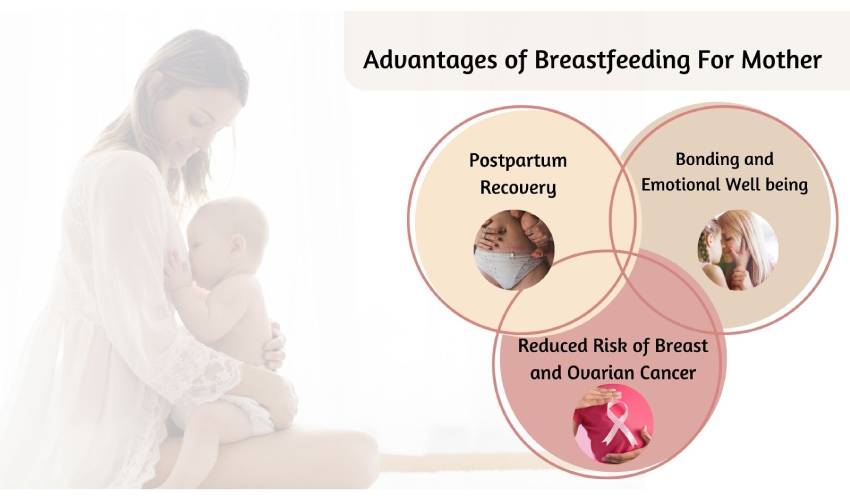Breastfeeding a baby is a natural and essential aspect of motherhood that provides countless benefits to both the baby and the mother. It is a unique bonding experience that promotes optimal health and well-being for both parties involved. This act of nourishing an infant with breast milk is not only a means of providing vital nutrients, but it also fosters a unique bond between mother and child.
The amazing advantages of nursing will be discussed in this blog, along with the reasons why breastfeeding is highly advised by healthcare professionals all over the world.
What is Breastfeeding?
Breast milk, often referred to as “liquid gold,” is a miraculous substance that is specifically tailored to meet the nutritional needs of a growing baby. It contains the perfect balance of proteins, fats, and carbohydrates, along with essential vitamins, minerals, and antibodies that help protect the baby from infections and diseases. Breast milk also adapts to the changing needs of the baby, providing the necessary nutrients as the baby grows and develops.
Breastfeeding is not just about providing nourishment; it is also a beautiful and intimate experience that strengthens the emotional bond between mother and child. Physical closeness, skin-to-skin contact, and eye contact during breastfeeding create a sense of security and love for both the baby and the mother. It is a time for relaxation, comfort, and mutual understanding.
Breastfeeding is a remarkable and invaluable gift that a mother can give to her baby. It provides essential nutrients, strengthens the immune system, promotes bonding, and offers numerous health benefits for both mother and child. While breastfeeding may come with its own set of challenges, the rewards far outweigh the difficulties. Every mother should be encouraged and supported in her breastfeeding journey, as it is a beautiful and natural way to nourish and nurture her baby.
Advantages of Breastfeeding For Mother
There are several advantages to breastfeeding for a mother. Here are the benefits of breastfeeding for a mother:
1. Postpartum Recovery: Oxytocin is released when a woman breastfeeds, and this process aids the uterus to shrink and get back to its pre-pregnancy size. This natural process aids in postpartum recovery and reduces the risk of excessive bleeding. Additionally, breastfeeding promotes the gradual return to pre-pregnancy weight by burning extra calories.
2. Bonding and Emotional Well-being: The act of breastfeeding strengthens the bond between a mother and her baby. Skin-to-skin contact, eye contact, and physical closeness during breastfeeding promote feelings of love, comfort, and security. The release of oxytocin, also known as the “love hormone,” fosters a deep emotional connection between the mother and her child.
3. Reduced Risk of Breast and Ovarian Cancer: Breastfeeding has been found to have a protective effect against breast and ovarian cancer. The longer a woman breastfeeds during her lifetime, the more she reduces her risk of developing these types of cancer. This is due to the hormonal changes that occur during lactation, which help to suppress the growth of cancer cells.
Learn about Breast Cancer Treatment Cost in India.
4. Breastfeeding might aid in weight loss: Perhaps you’ve heard this one before.While some women appear to gain weight while breastfeeding, others appear to do so effortlessly. Breastfeeding does burn more calories than not breastfeeding, and after a period of lactation, you’ll undoubtedly see an increase in fat burning.
5. Breastfeeding aids with uterine contractions: Your uterus increases significantly throughout pregnancy, going from the size of a pear to nearly taking up the entire area of your belly. After delivery, your uterus experiences involution, which helps it regain its pre-pregnancy size. The surge in the hormone oxytocin that is brought on by pregnancy facilitates this process. Your body releases a lot of oxytocin during labor to help with delivery and minimize bleeding. Oxytocin levels also rise as a result of breastfeeding. It promotes uterine contractions, reduces bleeding, and helps the uterus regain its previous size. Additionally, studies have demonstrated that moms who breastfeed typically experience less postpartum blood loss and uterine involution that is more rapid.
Benefits for the Baby
1. Optimal Nutrition: Breast milk is often referred to as “liquid gold” for a good reason. It contains the perfect balance of nutrients, vitamins, and antibodies that are essential for the baby’s growth and development. It is specifically tailored to meet the unique nutritional needs of the infant, providing complete nourishment in the early months of life.
2. Enhanced Immune System: Breast milk boosts the baby’s immune system, protecting them against a wide range of infections and illnesses. It is rich in antibodies and immune cells that help fight off bacteria, viruses, and other harmful pathogens. Breastfed babies have a lower risk of developing respiratory infections, gastrointestinal disorders, ear infections, and allergies.
3. Reduced Risk of Chronic Diseases: Studies have shown that breastfeeding can significantly reduce the risk of various chronic diseases later in life. Breastfed babies have a lower incidence of obesity, type 2 diabetes, asthma, certain types of cancer, and cardiovascular diseases. The long-term benefits of breastfeeding extend well beyond infancy, providing a strong foundation for a healthier future.
4. Babies receive the best nourishment from breast milk: The majority of medical practitioners advise breastfeeding exclusively for at least six months and preferably much longer. Breast milk carries all the nutrients a newborn needs in the right amounts for the first six months of life. In reality, it contains a wide range of components to meet the baby’s varying needs, particularly in the first month of life. The breasts of a woman generate colostrum, a thick, yellowish fluid, right after giving birth. It is low in sugar, high in protein, and has a lot of healthful nutrients.
The best first milk is colostrum, which supports the development of the newborn’s developing digestive system. The breasts begin generating more milk after the first few days as the infant’s tummy grows. The only thing that might be missing from your supply of miraculous milk is vitamin D.
Bottom line
There are numerous advantages to breastfeeding for both the mother and the child. From providing optimal nutrition and boosting the baby’s immune system to aiding postpartum recovery and reducing the risk of chronic diseases, breastfeeding is a natural and powerful way to promote the well-being and health of both mother and child. It is a unique bonding experience that creates a strong emotional connection between the two, fostering a lifetime of love and care. As healthcare professionals advocate, breastfeeding is the best start a mother can give to her baby, laying the foundation for a healthier and happier future.
Although breastfeeding is a natural process, it may not always come easily or without challenges. Some mothers may face difficulties such as sore nipples, engorgement, or low milk supply. However, with the right support and guidance, most obstacles can be overcome, and breastfeeding can become a joyful and rewarding experience.
It is important to note that breastfeeding is a personal choice, and every mother should be supported in making the decision that is best for her and her baby. While breastfeeding is highly recommended by healthcare professionals, there are circumstances where it may not be possible or suitable. In such circumstances, formula feeding can also give the infant the necessary nourishment.








